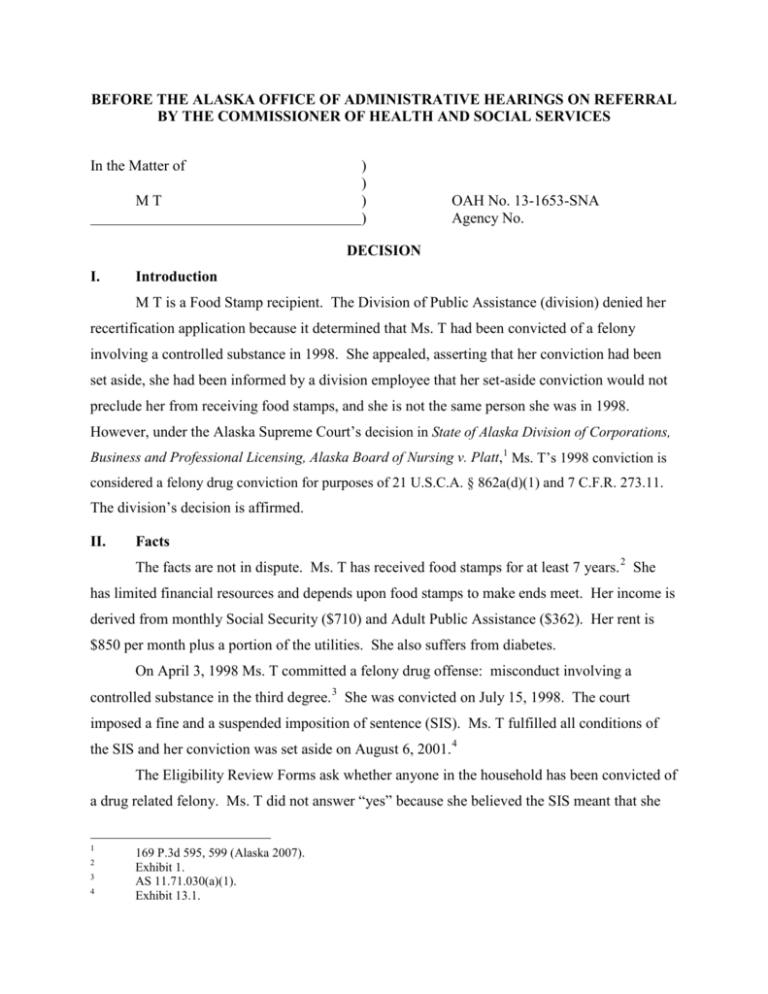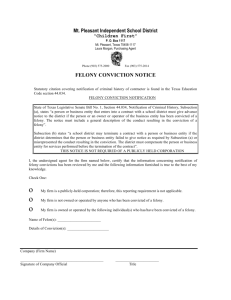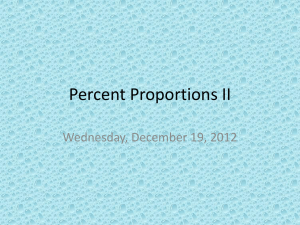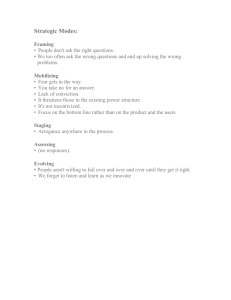before the alaska office of administrative
advertisement

BEFORE THE ALASKA OFFICE OF ADMINISTRATIVE HEARINGS ON REFERRAL BY THE COMMISSIONER OF HEALTH AND SOCIAL SERVICES In the Matter of MT ) ) ) ) OAH No. 13-1653-SNA Agency No. DECISION I. Introduction M T is a Food Stamp recipient. The Division of Public Assistance (division) denied her recertification application because it determined that Ms. T had been convicted of a felony involving a controlled substance in 1998. She appealed, asserting that her conviction had been set aside, she had been informed by a division employee that her set-aside conviction would not preclude her from receiving food stamps, and she is not the same person she was in 1998. However, under the Alaska Supreme Court’s decision in State of Alaska Division of Corporations, Business and Professional Licensing, Alaska Board of Nursing v. Platt, 1 Ms. T’s 1998 conviction is considered a felony drug conviction for purposes of 21 U.S.C.A. § 862a(d)(1) and 7 C.F.R. 273.11. The division’s decision is affirmed. II. Facts The facts are not in dispute. Ms. T has received food stamps for at least 7 years. 2 She has limited financial resources and depends upon food stamps to make ends meet. Her income is derived from monthly Social Security ($710) and Adult Public Assistance ($362). Her rent is $850 per month plus a portion of the utilities. She also suffers from diabetes. On April 3, 1998 Ms. T committed a felony drug offense: misconduct involving a controlled substance in the third degree. 3 She was convicted on July 15, 1998. The court imposed a fine and a suspended imposition of sentence (SIS). Ms. T fulfilled all conditions of the SIS and her conviction was set aside on August 6, 2001. 4 The Eligibility Review Forms ask whether anyone in the household has been convicted of a drug related felony. Ms. T did not answer “yes” because she believed the SIS meant that she 1 2 3 4 169 P.3d 595, 599 (Alaska 2007). Exhibit 1. AS 11.71.030(a)(1). Exhibit 13.1. was no longer a felon. The division did not challenge Ms. T’s testimony that she regularly informs the division that she has an SIS as a result of a drug related felony, or that an unidentified division supervisor told her that her felony no longer exists so she was eligible for food stamps. 5 Any misrepresentation by failing to mark “yes” on her food stamp application when asked if she had been convicted of a drug related felony was unintentional. Ms. T now understands she received incorrect information from the division all those years ago. III. Discussion The Food Stamp program is a Federal program administered by the states. The issue presented for hearing is whether Ms. T’s 1998 felony drug conviction is a barrier crime under 21 U.S.C.A. § 862a(d)1) and 7 C.F.R. § 273.11(m) that makes her ineligible to receive food stamps. Individuals convicted of a drug related felony conviction are ineligible to be counted as a household member for purposes of food stamps. 6 Ms. T lives alone. If her SIS does not erase the conviction, her household cannot receive food stamps. In 1996, the Welfare Reform Act 7 disqualified persons convicted of certain drug related felonies from receiving benefits under the federal food stamp program. 8 Ms. T pled no contest to, and was found guilty of, Misconduct Involving a Controlled Substance in the Third Degree. That crime involved the possession, use, or distribution of a controlled substance, and is a felony in the State of Alaska. 9 Accordingly, Ms. T’s crime constituted a “drug-related felony conviction” within the meaning of the applicable regulation, presumptively disqualifying her from the Food Stamp program. The Alaska Supreme Court addressed the effect of the set-aside of a criminal conviction (i.e. a Suspended Imposition of Sentence) in State of Alaska Division of Corporations, Business and Professional Licensing, Alaska Board of Nursing v. Platt. 10 In Platt, the court explained that while an SIS limits the consequences of the conviction and indicates that the defendant has rehabilitated, an SIS does not “change the fact that an individual was previously found guilty of committing a crime.” 11 Such is the case here. 5 Whether this action would give rise to the equitable defense of estoppels should the division seek to recover any overpayment is beyond the scope of this proceeding. 6 7 C.F.R. § 273.11(m). 7 Public Law No. 104-193, 110 Stat. 2105 (Aug. 22, 1996) Personal Responsibility and Work Opportunity Reconciliation Act (Welfare Reform Act). 8 21 U.S.C.A. § 862a (a), (d)(2). 9 AS 11.71.030. 10 169 P.3d 595, 599 (Alaska 2007). 11 Id. OAH No. 13-1653-SNA 2 Decision Ms. T has changed since she was convicted in 1998. Drugs are no longer a part of her life. However, under Platt, a conviction is still a conviction even when it has been set aside. Neither the division nor this tribunal may disregard the court’s interpretation regarding the limitations of a setaside conviction. Accordingly, the division was correct to conclude that Ms. T’s conviction counts as a felony drug conviction for purposes of the Food Stamp program, even though the Claimant was granted a Suspended Imposition of Sentence (SIS). IV. Conclusion Ms. T’s 1998 felony drug conviction, even though set aside, is a barring condition preventing her from being counted as a household member for purposes of food stamps. The decision of the division to deny recertification of Ms. T’s application for food stamps is affirmed. DATED this 10th day of December, 2013. By: Signed Rebecca L. Pauli Administrative Law Judge Adoption The undersigned adopts this decision as final under the authority of AS 44.64.060(e)(1). Judicial review of this decision may be obtained by filing an appeal in the Alaska Superior Court in accordance with AS 44.62.560 and Alaska R. App. P. 602(a)(2) within 30 days after the date of this decision. DATED this 24th day of December, 2013. By: Signed Signature Rebecca L. Pauli Name Administrative Law Judge Title [This document has been modified to conform to the technical standards for publication.] OAH No. 13-1653-SNA 3 Decision






